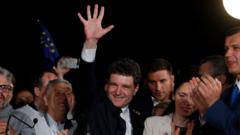Nicusor Dan, a mathematician and current mayor of Bucharest, has been elected as Romania's president, representing a shift away from hard-right nationalism. His victory reflects a desire for political change amid concerns over Russia's influence and the future of Romanian democracy within the European framework.
A New Dawn for Romania: Nicusor Dan Elected President Amidst Divisions

A New Dawn for Romania: Nicusor Dan Elected President Amidst Divisions
The election of Nicusor Dan signals a call for change in Romania's political landscape, as the country grapples with deep partisan divides and aspirations for a European future.
In the wake of introducing a fresh perspective to Romanian politics, the newly elected President Nicusor Dan, affectionately known as Nicky, has pledged to maintain a sense of normalcy for his family after his triumph at the polls. However, the country faces substantial challenges and divisions following a spirited election race marked by contrasting ideologies.
Dan, who secured his position after serving as the mayor of Bucharest since 2020, is largely perceived as a response to the longstanding political elites who have dominated Romania for over thirty years. His election stands as a popular protest against the status quo, particularly when juxtaposed with his opponent, the hard-right nationalist George Simion. With a platform of fear versus fury, Dan's supporters rallied together from various urban demographics to ensure a collective mobilization against Simion's radical agenda, which some deemed dangerous for the country's future.
The election attracted substantial interest within the electorate, highlighted by a notable increase in voter turnout. In conversations with voters, sentiments around preserving democratic values and European ties emerged as significant motivators behind their choices. Supporters of Simion, despite their loyalty to his traditional values rhetoric, voiced disappointment at the election's outcome, expressing concerns about the direction of the country.
Several factors influenced the election process, including Simion's missteps during his campaign. His attempts at international diplomacy were criticized, such as his interactions in France that many perceived as rude. Meanwhile, Dan's campaign emphasized a pro-European agenda, replacing fears of nationalism with the promise of collaboration with the European Union for national development and stability.
Among the varied voices in Romania, there were those who believed this election represented a turning point, a final chance to stabilize the political narrative in favor of democracy and integration into the European mainstream. As celebrations broke out on the streets following Dan's victory, crowds chanted their resolve against foreign interference, particularly targeting Russia's influence in domestic politics.
With Dan's election, the challenge lies ahead as the country transitions towards a leadership focused on unity and development while navigating the complexities of a divided electorate. The question remains whether Dan can meet the high expectations of his supporters and guide Romania away from the brink of nationalist politics towards a brighter European future.
Dan, who secured his position after serving as the mayor of Bucharest since 2020, is largely perceived as a response to the longstanding political elites who have dominated Romania for over thirty years. His election stands as a popular protest against the status quo, particularly when juxtaposed with his opponent, the hard-right nationalist George Simion. With a platform of fear versus fury, Dan's supporters rallied together from various urban demographics to ensure a collective mobilization against Simion's radical agenda, which some deemed dangerous for the country's future.
The election attracted substantial interest within the electorate, highlighted by a notable increase in voter turnout. In conversations with voters, sentiments around preserving democratic values and European ties emerged as significant motivators behind their choices. Supporters of Simion, despite their loyalty to his traditional values rhetoric, voiced disappointment at the election's outcome, expressing concerns about the direction of the country.
Several factors influenced the election process, including Simion's missteps during his campaign. His attempts at international diplomacy were criticized, such as his interactions in France that many perceived as rude. Meanwhile, Dan's campaign emphasized a pro-European agenda, replacing fears of nationalism with the promise of collaboration with the European Union for national development and stability.
Among the varied voices in Romania, there were those who believed this election represented a turning point, a final chance to stabilize the political narrative in favor of democracy and integration into the European mainstream. As celebrations broke out on the streets following Dan's victory, crowds chanted their resolve against foreign interference, particularly targeting Russia's influence in domestic politics.
With Dan's election, the challenge lies ahead as the country transitions towards a leadership focused on unity and development while navigating the complexities of a divided electorate. The question remains whether Dan can meet the high expectations of his supporters and guide Romania away from the brink of nationalist politics towards a brighter European future.























